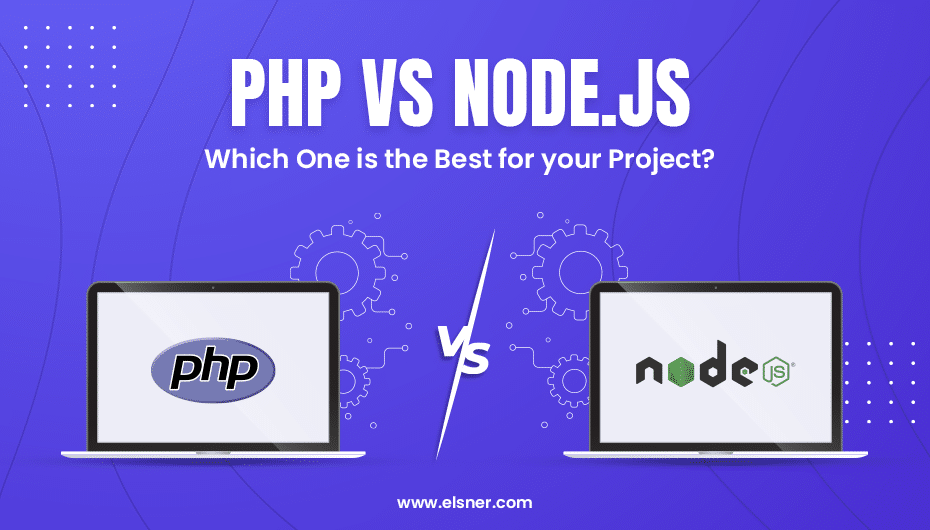In this technological generation, each business has a digital presence on the web, and thus, it requires obtaining a powerful web platform alongside the backend side of the web. However, there are many technical choices available to build a web platform; among them, there are two dominant and open-source solutions recognized as PHP and Node.js.Node.js and PHP development both are powerful backend technologies. PHP has been considered for server-side scripting. In contrast, Node.js is functioning on the V8 engine and executes JavaScript code outside a web browser. PHP is the most standard, and older technology on the diverse side Node.js is newer yet perfectly accommodated to the requirements of advanced web applications. It’s a tough decision to pick any one of them for the next project. We have wrapped up all the required information in this article which will facilitate in choosing an appropriate one.
Overview of PHP
PHP is the most popular open-source server-side scripting language. Rasmus Lerdorf launched it in 1994. The largest giants of the world, such as Facebook, Wikipedia, Slack, Tumblr, WordPress, and many more, have adopted PHP.
Pros of using PHP:
- Improved loading page speed: The use of PHP technology makes web pages faster than others. For instance, a few years ago, Python web pages were faster than PHP, but after releasing PHP 7, the scenario has changed. Nowadays, PHP is almost three times quicker than Python and considerably faster than other technologies.
- Wide selection of databases: PHP provides connection flexibility with many databases. Most developers select MySQL as it is effective, free, and famous throughout the community. Some preferences of database management systems available that are consistent with PHP are SQLite, MS-SQL, MySQL, PostgreSQL, etc. PHP is further effectively used in other non-relational-databases such as Redis, MongoDB, Elasticsearch. By this, the engineers will have a broad range of databases, and they may select the optimal one for a future project and consider all related elements.
- Inexpensive open-source software: PHP is open-source and free to exploit technology. Therefore, there are different frameworks such as Laravel, CodeIgniter, CakePHP, Yii, and many alternatives exist. Also, some CMS platforms like WordPress and Drupal extend the functionality of PHP.
- Cheaper hosting service: A PHP website base is the LAMP stack. All the peripherals of LAMP like Linux, Apache, MySQL, and PHP are accessible and assessed, which signifies the contraction of needed time and funds for the development.
- Flexibility: PHP is a cross-platform language. Hence, engineers may employ any fundamental operating systems like Windows, Linux, macOS to write programs that act faster and less pricey.
Cons of using PHP:
- Security: It is not that secure due to its open-source. This is because the ASCII text file is often readily available.
- Low Performance: Using more PHP framework and tools features cause the unsatisfactory performance of online applications. The PHP frameworks aren’t proportionate in behavior so manage their performance and features
- Deviation: On the other hand, PHP’s resilience is its deviation. The lack of formation and rigid architecture allows devs to designate the path of coding that is suitable for them. This doesn’t mean on the couch vs. by the table. This states that the codes of different PHP developers may face strange problems. Also, the issue with the code’s architecture is something the IT community prefers to call Spaghetti code. That is an inadequately designed application with severe to understand and maintain code. This issue can be settled by implementing frameworks, OOP solutions, and others.
Overview on Node.js
Node.js is an open-source and cross-platform on Google Chrome’s V8 JavaScript engine. Ryan Dahl developed Node.js first in 2009, and its latest version is 16.6.1. Node.js is often run to develop a faster and more scalable application as it is written in JavaScript and can be run on Linux, Windows, and macOS.
Pros of using Node.js:
- Efficient to treat a call request: A crucial aid of using Node.js is its strength to deal with multiple call requests simultaneously. Thanks to the asynchronous processing of numerous requests. The system isn’t waiting for one process to end before the next one comes out. CPU and RAM times are likewise not drained. The system runs by providing preference to those call requests that hold the least response time.
- Faster: Node.js is among very few asynchronous development environments. This, being a significant differentiator, gives Node.js development an inch over other languages. Being asynchronous means that it calls not to wait for an element to be well accomplished before hauling the next one. This type of execution drastically reduces the downtime for the web app and acts for seamless user action.
- Real-Time Communication: This emphasizes a substantial relationship between the user and the server, which means there’s no decrease between what a user requests for and the server handling the request.
- Caching Efficiency: It possesses an impressive strength to cache data. When requests are performed to the app, it caches them in-app memory. Consequently, when requests cycle through execution and re-execution, the nodes can even run effectively and not be exterminated by archival data.
- Performance: The asynchronous character of Node.js with JavaScript V8 Engine gives Node.js a critical execution speed and quick startup time. Node.js is event-driven, it doesn’t block call requests to complete existing ones. This order-independent execution is broadly attributed to as ‘adequacy.’ Concurrent module execution means that they deal with multiple modules simultaneously, but not together.
Cons of using Node.js:
- Unstable API: One of the critical issues that most developers face is that the Application Programming Interface (API) turns at periodic layoffs and does not remain steady. Its Application User Interface has passed through several transformations. Moreover, not all those modifications are backward compatible. That means developers have to force reforms in the available codebases to provide compatibility with the latest version of the Node.js API. Sometimes. It’s not absolutely ideal.
- Weak Library: Despite JavaScript’s universal acceptance, its library system leaves considerable to be appealed. Because of this, developers usually have to stand on the support of some of its more complex functions, like XML parsing, processing of images, database operations, or object-relational mapping. It means that several foundational tasks in Node can be hard to implement.
- Ineffectual with CPU: It is considered single-threaded because it processes JavaScript, which is, of course, single-threaded. Its non-blocking input/output model uses an event loop to deal with threads asynchronously. And this takes excellent—until Node receives a CPU-constrained task. It prioritizes these huge, CPU-bound tasks first, which occurs in slow processing and overall lag in the event loop. Therefore, many programmers say Node.js is not a reliable tone for apps that call for excessive computation. It’s significant to indicate that in 2018, it folded out a multi-threading tool called worker threads as pulling out of its 10.5.0 update. This component can leverage different threads from a thread pool to perform heavy parallel processes on different threads. It’s even considered empirical, but it could run a long way towards mitigating this apparent defect in the future. Still, it’s one of Node’s pros and cons you have to examine very delicately.
When to Run with PHP and When to Run with Node.js?
So the definite answer on what to choose between PHP vs. Node.js lies in figuring out the components your web project requests.With its performance and simplicity of development advantages, it’s best to use Node.js to establish:
- Real-time applications, such as instant messengers
- A single page application
- At the time when you are going to use front end technologies like – React and Angular
On the other side, PHP is optimal for:
- CMS website, e-Commerce platform, and Static-Dynamic websites
- With LAMP stack (Linux Apache, MySQL, PHP)
- When you require to prioritize ease of deployment and integration,
Conclusion:
There is no standardized process to analyze if Node.js is better than PHP or vice versa. However, instead of deciding to assess which technology transcends the diversity, it’d take you thoroughly to first sketch out the needs of your project and later choose the technology that best prepares it.




